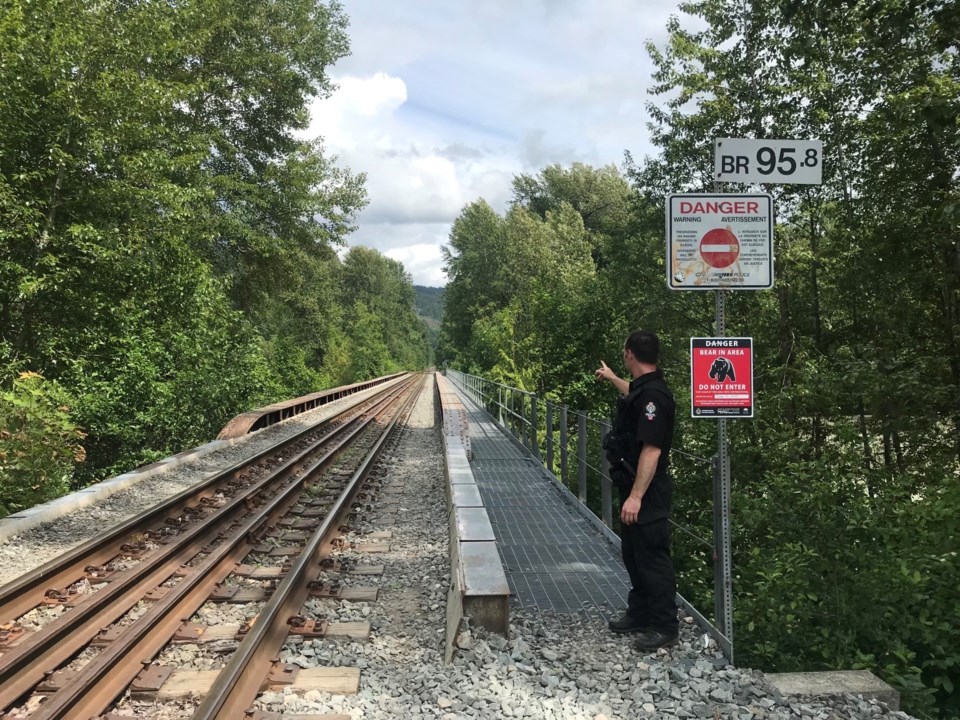A black bear responsible for two separate attacks near Pemberton this week has been euthanized, the BC Conservation Officer Service (COS) confirmed Tuesday.
According to COS Sgt. Simon Gravel, the agency's Predator Attack Team (COS PAT) responded to the area after a witness reported seeing a black bear charge and bite a woman while she was walking along the Riverside Wetlands trail shortly after 9:30 a.m. on Monday, June 13.
"We confirmed with the victim that she got attacked by a bear that charged her out of nowhere," said Gravel. "She gave us a very good description and location."
The woman was bit in the hand while trying to defend herself, he explained. The victim received medical treatment for her injuries as conservation officers worked with the Squamish-Lillooet Regional District to close the trail to the public and launch an investigation.
Soon after, conservation officers received word from another witness of a similar attack that had occurred in the same area the night before, on Sunday, June 12. That incident also involved a woman who was bitten by a black bear. No puncture wounds were detected, Gravel said, but the woman suffered a broken wrist when the animal knocked her to the ground. "We also got multiple reports that same day, I think, with the same description and same general area [of the bear] charging people," he added.
Conservation officers set a trap and initially captured a black bear Monday night that officials quickly determined was not involved in either attack. That animal was tagged and released before officials found the suspected bear the following morning. "We determined it was the matching bear and the bear was killed on-site," said Gravel.
Though both women were walking along the trail with dogs when they were attacked, Gravel stressed that there's no indication the victims or their pets provoked the bear in either incident. Instead, evidence shows the bear's aggression was most likely the result of being continuously chased by off-leash dogs in the weeks leading up to the incidents.
"In talking with wildlife biologists, they really put a lot of emphasis on the fact that this behaviour can be avoided if people are controlling their dog," said Gravel. "Can you imagine that a dog off-leash can be successful in chasing a bear away, but if a bear gets chased by dogs 100 times, actually they change their behaviour and learn to charge back and defend themselves."
Eventually, bears will even learn to proactively react defensively to any dogs on the trail, Gravel said.
"In this case, the dog itself didn't charge the bear at all. We're talking about a bear who's proactively charging a dog owner just because they were there," he added. "In this case, this bear had two yearling cubs, so it is definitely typical learned behavior to defend their cubs."
After consultation with wildlife biologists, conservation officers determined the yearling cubs were not displaying any concerning behaviour and were big enough, old enough and in good enough habitats to be left to their own devices.
"It's very unfortunate and we feel for the victims that had those very negative encounters with bears," said Gravel. It's important that all trail users in the Sea to Sky corridor make the effort to recreate with their dogs safely, he added, especially considering that allowing pets to harass wild animals like bears remains illegal under B.C.'s wildlife act.
"People are dog lovers, they want their dog with them, but in any case, dogs shouldn't be charging or chasing wildlife," he said.
The conservation officer recommends carrying bear spray while taking a stroll through bear habitats—even if you don't plan on straying far from the pavement—being aware of your surroundings and choosing areas that offer decent sightlines of the trail ahead.
"If you do walk in an area where you cannot necessarily have a good overview of the area, then make yourself known," said Gravel. "If you're alone, make some noise, talk to yourself. That helps to not surprise any bears."




